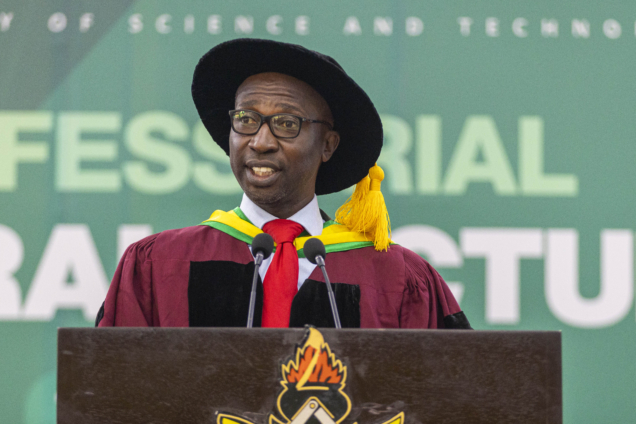Professor Nathaniel Owusu Boadi, a Professor of Chemistry at the Kwame Nkrumah University of Science and Technology (KNUST), has called on the government to commit substantial funding to support research and development in nanomaterial applications for energy generation.
He has also suggested that regulatory agencies such as the Environmental Protection Agency and Ghana Standards Authority should urgently establish and enforce science-based safety standards for the production, use and disposal of nanomaterial.
These regulations should promote responsible technological advancement, while ensuring compliance with international best practices.
Prof. Owusu Boadi, who was speaking at his Professorial Inaugural Lecture at the KNUST, entreated the Ministry of Science and Technology to collaborate with the Finance Ministry, academic institutions, and industry stakeholders to establish a National Nanotechnology Research Center.
This Center, he believed, could be used to develop streamlined technology transfer programmes to accelerate the commercialization of home-grown nanotech solutions for Ghana’s energy challenges.
His Lecture titled: “Toward Accessible Green Energy for All: Harnessing the Power of the Invisible Giants” traced historical development of nanomaterials, from their early applications in medieval artefacts to their transformative role in modern energy technologies.
The Professor of Chemistry elaborated on the significance of nanomaterials in contemporary industrial use including enhancing solar cells efficiency, improving battery performance, and boosting fuel cell technology in energy.
In health, it improves imaging for early diagnosis and supports tissue regeneration.
Environmental applications include advanced water filtration and purification and hazardous waste clean-up.
The electronic industry benefits from faster semi-conductors, high resolution quantum dots and precise nanosensors.
Nanotechnology also enhances durability, stain resistance and antibacterial properties in textiles while enabling smart fabrics.
Prof. Owusu Boadi indicated that access to reliable and sustainable energy remained a challenge for many developing countries including Ghana.
As of 2022, approximately 600 million people in sub-Saharan Africa lacked electricity representing 43 percent of the continent’s population.
He noted that the disparity for electrification across the continent underscored the need for innovative and sustainable solutions to expand energy access.
Ghana has emerged as one of the leaders in electrification in sub-Saharan Africa achieving an 85.1 percent electricity access rate as of 2022 with 95 percent access in the urban areas and 75.1 percent access in the rural areas.
While thermal plants dominate generation, their reliance on fossil fuels raises sustainability concerns making the expansion of renewable sources of energy like solar essential for a more resilient and environmentally friendly power sector.
Prof. Owusu Boadi, who is also the Vice-Dean at KNUST Faculty of Physical and Computational Sciences, recommended that to maintain progress and reach full electrification, Ghana must integrate more renewable energy sources into its power mix, reducing dependence on fossil fuels and mitigating environmental impacts.
He said Ghana and many African countries experienced much sunshine; it was paradoxical that access to solar energy remained limited due to the prohibiting cost of conventional silicon-based solar cells.
GNA



